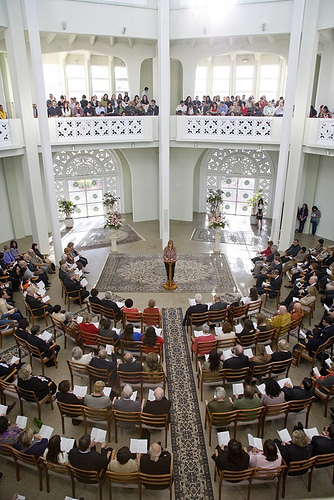
Baha’is across Australia are marking the second anniversary of the imprisonment of seven Baha’i leaders in Iran with special prayer meetings.
As similar gatherings take place around the world, new details have emerged about the inhumane conditions under which the seven are being detained in Tehran’s notorious Evin Prison.
“These seven innocent people are held in two small cells in which it is hard to move or rest,” said Australian Baha’i Community spokesperson Tessa Scrine.
“They sleep on a blanket on the cement floor, they are only permitted fresh air for two hours a week, and the place has a foul smell,” Ms Scrine said.
“Their health is deteriorating as a result of these appalling conditions, which violate all international standards,” she said.
“We call on the Iranian authorities to immediately free these seven people, who have been incarcerated without sentence for two years.
“At the very least, they should be released on bail pending a prompt, fair and open trial that upholds international legal standards.”
Solidarity
In an act of solidarity with the imprisoned leaders, the human rights network United4Iran is asking people worldwide to replicate the dimensions of the cells in which they are being held, and document themselves confined to the space.
The photographs and video clips will be placed on-line to bring the international community’s attention to the ongoing arbitrary imprisonment of the seven leaders.
Until their arrest, the five men and two women were members of an informal group that saw to the spiritual and social needs of the Baha’is of Iran. The Baha’i Faith is Iran’s biggest religious minority.
Fariba Kamalabadi, Jamaloddin Khanjani, Afif Naeimi, Saeid Rezaie, Behrouz Tavakkoli and Vahid Tizfahm were arrested in dawn raids on their homes in Tehran on 14 May 2008. The seventh member, Mahvash Sabet, was arrested two months earlier in the city of Mashhad.
American journalist Roxana Saberi, who was held in Evin Prison for more than three months in 2009, has recently spoken about Mrs Kamalabadi and Mrs Sabet, with whom she shared a cell for about three weeks.
“Fariba and Mahvash were two of the women prisoners I met in Evin who inspired me the most,” Ms Saberi said in a recent interview.
“They showed me what it means to be selfless, to care more about community and beliefs than about oneself,” Ms Saberi said.
